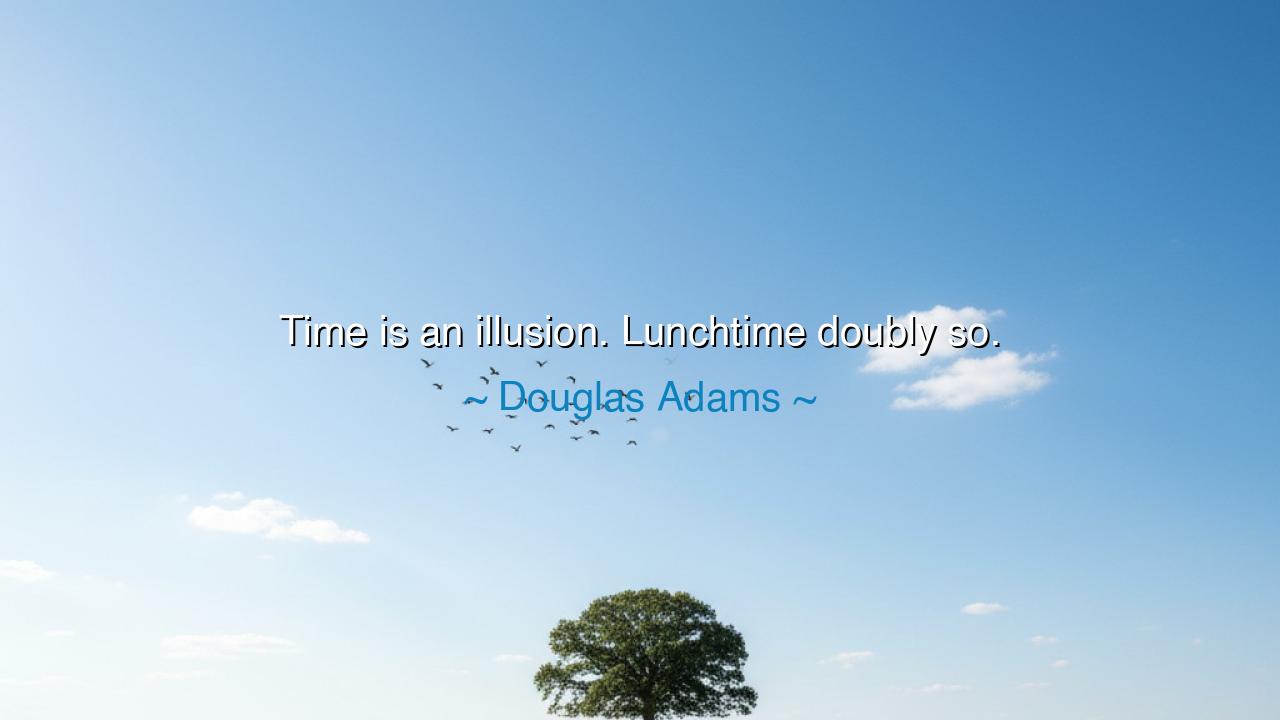
Time is an illusion. Lunchtime doubly so.






Douglas Adams, the bard of wit and cosmic satire, once penned with mischievous wisdom: “Time is an illusion. Lunchtime doubly so.” Though lighthearted in form, this saying carries beneath its humor the deep reflection of philosophy, wrapped in laughter so that the truth may slip more easily into the heart. For Adams, as for many thinkers before him, time was never as straightforward as the ticking of a clock; it was a human construct, a fragile order imposed on the vast chaos of the universe. And in the midst of this great enigma, the trivialities of life—such as lunchtime—become even more absurd.
The meaning of this quote rests first in the recognition that time, as we measure it, is not ultimate reality but perception. The ancients understood this: Heraclitus spoke of the river that is never the same twice, and Augustine confessed that when he tried to define time, it slipped from his grasp. Adams, with a voice of irony, takes this grand mystery and grounds it in the mundane—reminding us that if time itself is but an illusion, then our schedules, our meals, and our daily rituals are even less solid, even more comical in their supposed importance.
Yet within the humor lies a subtle challenge. How much of our lives are ruled by the tyranny of the clock? How many of our days are consumed by chasing deadlines, by worrying about minutes, by dividing existence into rigid compartments? Adams mocks this slavery by reminding us that even lunchtime—that sacred pause in the day—is not as real or essential as we imagine. Our hunger makes it urgent, our routine makes it fixed, but in the eternal expanse of the cosmos, it is dust. To laugh at it is to loosen our chains.
History gives weight to this playful wisdom. Consider Albert Einstein, who shattered the old understanding of time with his theory of relativity. He showed that time bends and shifts, that it is not universal but dependent on speed and gravity. To one observer, an hour may pass swiftly, to another, slowly. In such a universe, Adams’ humor rings true: if even science has revealed the slipperiness of time, then surely the daily schedules we cling to are twice the illusion. What we call lunchtime is but a shadow dancing on the wall of perception.
The lesson for us is to live with humility before the mystery of existence. Do not bind yourself too tightly to the illusion of control that time appears to offer. Yes, honor discipline and routine, but do not let them enslave you. Recognize that moments are gifts, not measurements, and that laughter itself may be a greater truth than the ticking of the clock. By smiling at the absurdity of lunchtime, Adams invites us to loosen our grip on the illusion, to embrace life as play rather than as a rigid schedule.
In practice, this means being present. Do not waste your days lamenting the past or fretting about the future, for both are phantoms. Do not be ruled by the clock to the point that you forget the joy of the present meal, the present laugh, the present friend across the table. Use time as a tool, but remember it is not the master. And above all, do not fear its passing, for in truth, what passes is illusion; what remains is the spirit, the joy, the love we share in each fleeting moment.
Therefore, children of tomorrow, remember the paradox Adams gifted us: “Time is an illusion. Lunchtime doubly so.” Do not despair at the slipping sands of hours, nor worship the routine of daily schedules. Laugh at them. Live in the eternal present, where every moment can be savored. For to see the humor in life’s illusions is itself a form of wisdom, and to walk with laughter through the mystery of existence is to be free.






AAdministratorAdministrator
Welcome, honored guests. Please leave a comment, we will respond soon